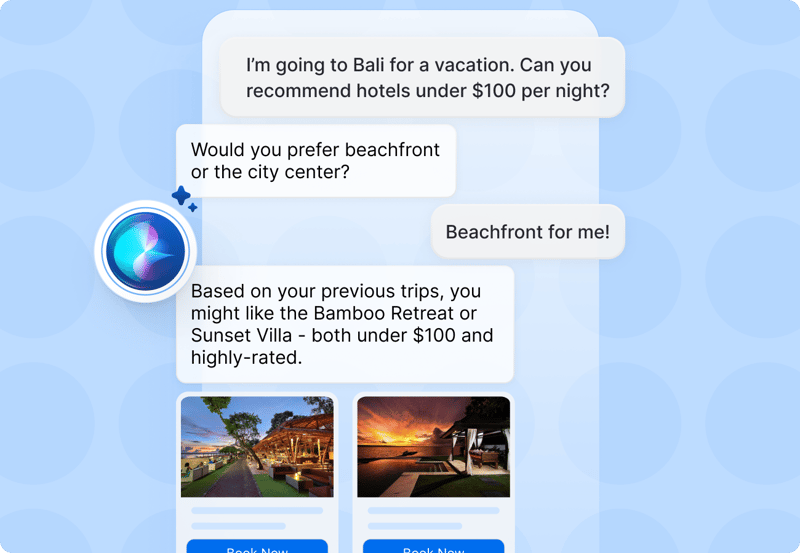Customer service has entered a new era where speed, consistency, and personalization are table stakes. As expectations rise, traditional service models are struggling to keep pace. That’s where AI agents for customer service are making a significant impact.
According to a forecast by Gartner, AI agents will resolve over 80% of routine inquiries by 2029 without human intervention. These intelligent agents are trained on enterprise data, fine-tuned with natural language capabilities, and designed to understand context, nuance, and even sentiment. All of that translates to seamless, always-on support that scales effortlessly.
The business case is clear. AI agents for customer service offer 24/7 availability and ensure every customer receives a timely, accurate response no matter the volume. And with conversational AI evolving rapidly, 2026 is the year when AI agents take ownership of core support tasks.
In this article, we’ll break down the best AI agents for customer service, explore real-world use cases, and show you how to choose the right tool for your business. Whether you're in eCommerce, fintech, or healthcare, there's an AI agent ready to elevate your support experience.
ALSO READ: What are the Main Benefits of AI Agents for Customer Service?
What Are AI Customer Service Agents?
AI customer service agents are intelligent systems that independently handle customer support interactions across multiple channels - chat, email, voice, and even backend workflows. Unlike rule-based chatbots of the past, AI agents are powered by large language models (LLMs), enabling them to understand context, recall previous interactions, and respond in real-time with accuracy and empathy.
These agents are not just scripted responders as they offer:
- Memory: Retaining past interactions to maintain continuity across sessions
- Contextual understanding: Adjusting responses based on user intent and tone
- Escalation logic: Handing off complex cases to human agents seamlessly
- CRM integration: Syncing with business systems for real-time data access and updates
This is what sets them apart from traditional AI assistants. While AI assistants typically focus on single-point tasks like scheduling meetings or setting reminders, AI agents are designed for goal-driven, multi-turn conversations that often span multiple systems and user intents. They operate autonomously, can handle hundreds of interactions simultaneously, and are purpose-built for operational efficiency.
In essence, AI customer service agents are the evolution of conversational AI as they not only assist but execute tasks based on pre-defined goals.
Benefits of AI Agents in Customer Support
Adopting AI agents for customer service unlocks a range of advantages that modern businesses can’t afford to overlook.
Speed and efficiency
AI agents resolve common queries in seconds, reducing average handling time (AHT). With the ability to manage thousands of conversations simultaneously, they eliminate wait times and accelerate resolution.
24/7 availability
No downtime, no holidays. AI customer service agents operate round-the-clock, ensuring that customers get instant support - whether it’s 2 PM or 2 AM - across time zones and geographies.
Reduce human agent workload
By automating tier-1 queries and repetitive tasks, AI agents reduce the burden on human agents. This allows support teams to focus on high-impact conversations that require empathy, creativity, or deep domain expertise.
Data-driven personalization
Integrated with CRMs and data sources, AI agents tailor responses using real-time customer data - purchase history, preferences, location, and more - creating hyper-personalized experiences that drive satisfaction and loyalty.
Accurate routing and Escalation
Not all issues can be handled by AI alone. Smart routing ensures that complex or sensitive conversations are escalated to the right human agent, armed with full context and conversation history, for a seamless handover.
.png?width=1200&height=383&name=AI%20lead%20Qualification%20Agent%20(1).png)
Top AI Customer Support Agents in 2026
| Tool | Company | Key strength | Ideal use case |
| Haptik’s AI Customer Service Agents | Haptik | Advanced handling of unstructured queries, enterprise-grade orchestration, multilingual voice/chat capabilities | High-volume customer support across chat and voice, especially for telecom, BFSI, and eCommerce enterprises |
| Einstein GPT | Salesforce | Native integration with CRM, case management, and data cloud for hyper-personalized service | Complex enterprise workflows where support is tightly coupled with sales and customer data |
| Dynamics 365 Virtual Agents | Microsoft | Strong voice and email automation, powered by Azure ecosystem and Power Platform | Enterprises seeking omnichannel support (voice, email, chat) with Microsoft stack integration |
| Ada AI | Ada | Low-code bot builder with advanced workflow automation and third-party integrations | D2C and consumer brands looking for fast deployment and scalable automation across support channels |
Use Cases: How AI Agents Help in Real Life
-
Hotel booking and concierge
24/7 multilingual support for reservations, upgrades, check-ins, and guest services - offered instantly across channels.
- Debt collection and follow-up: AI agents send timely, personalized repayment nudges and reminders - automating follow-ups while maintaining empathy.
- eCommerce returns: End-to-end automation of return requests, refund processing, and real-time order updates, improving customer satisfaction.
- High-volume support: Seamless integrations allow AI agents to auto-resolve up to 70% of incoming tickets, reducing the load on human agents.
AI agents and personalization
AI customer service agents are hyper-personalized. By pulling in CRM data such as purchase history or frequency of past issues, these agents tailor responses that feel human and relevant. Sentiment analysis helps them adjust tone and urgency based on how a customer is feeling in real time.
ALSO READ: What Is Human-In-The-Loop AI?
Conversational memory enables continuity, so customers don’t have to repeat themselves across sessions or channels. For example, if a customer’s previous chats were casual, the AI might mirror that tone in an email - switching from formal to conversational without missing a beat.
CRM and helpdesk integration
AI agents unlock their full potential when connected with CRM and helpdesk platforms. These integrations allow for seamless data flow, real-time actions, and intelligent automation across the customer journey.
- Real-time ticket creation: Automatically log support tickets based on user queries - from chat, voice, or email - and assign priority levels instantly.
- Field-level CRM updates: Capture key data points like issue type, frequency, resolution status, and customer sentiment, and push them to fields in Salesforce, Dynamics 365, or HubSpot in real time.
- Auto-tagging and classification: Use AI to classify tickets by topic or urgency, enabling better routing, faster triage, and clearer reporting dashboards.
- Intelligent escalations: Route complex or sensitive queries to the right human agent using historical context, sentiment, and SLA rules.
- Workflow automation with builders: Leverage no-code or low-code visual builders to set up intelligent workflows like auto-responses, CRM alerts, or escalation triggers.
- Unified customer view: With all interactions and updates synced, agents (human or AI) always have access to full conversation histories and customer profiles for faster, more personalized support.
Conclusion: The Future of Customer Service Is Agentic
AI agents for customer service are fast becoming a competitive necessity. In 2026, the best-performing brands are those that leverage AI agents not just to reduce costs or deflect queries, but to deliver smarter, faster, and more empathetic support experiences.
From real-time voice interactions and CRM-driven personalization to 24/7 multilingual automation, AI customer support agents are redefining what great service looks like. With powerful integrations, flexible deployment options, and measurable ROI, they’re elevating both customer satisfaction and team productivity.
Whether you're a fast-growing D2C brand or an enterprise handling millions of tickets a year, now is the time to invest in the right AI support tools and start transforming your service operations for the agent-powered era.
FAQs
Yes, most platforms like Zendesk, Freshdesk, and Salesforce offer native integrations or low-code builders for deploying AI agents.






